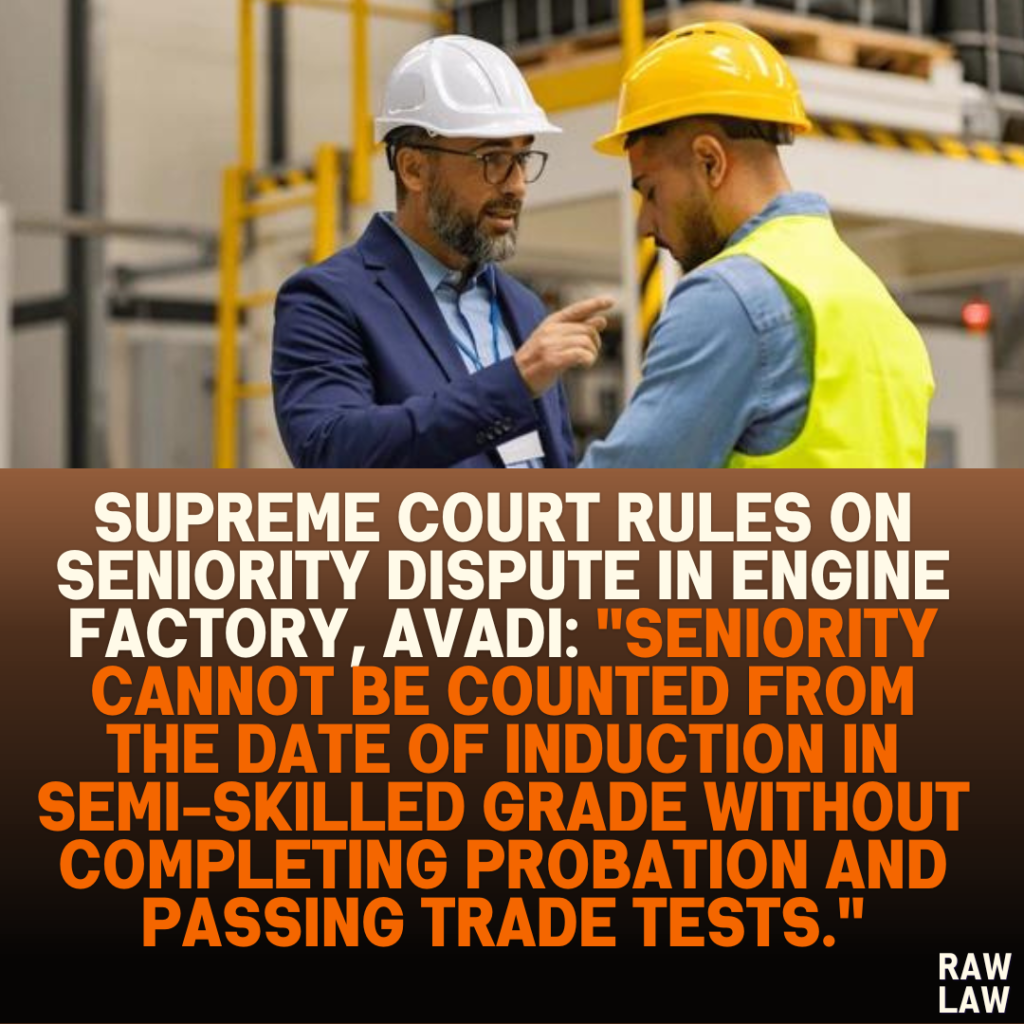Court’s Decision:
The Supreme Court dismissed the appeal and upheld the Madras High Court’s decision to restore the seniority of the private respondents, confirming that the seniority should be determined from the date of promotion to the skilled grade, rather than the date of initial appointment in the semi-skilled grade. The Court held that the appellant’s seniority could not be considered from the initial induction date as he failed to complete his probation period within the stipulated timeframe and pass the necessary trade test. The Court ruled that the appellant could not benefit from a subsequent change in rules which were prospective and could not alter settled seniority positions.
Facts:
The appellant and the private respondents were recruited in 1996 for semi-skilled positions such as Fitters and Machinists at an industrial establishment. They were placed on a common select list based on merit, with the appellant positioned higher than the respondents. The appellant was appointed as a Fitter (semi-skilled) and placed on probation for two years, which was further extended by six months. Upon successful completion of probation, the appellant was promoted to the skilled grade on 6th January, 1999, while the respondents were promoted earlier in July 1998.
A seniority list issued in 2006 ranked the respondents above the appellant, leading to a dispute over the correct determination of seniority. The appellant contested this list, claiming his seniority should be reckoned from his initial appointment date due to his higher position on the merit list.
Issues:
The core issue before the Court was to determine whether the seniority of the appellant should be based on his initial appointment date or from the date of his promotion to the skilled grade, considering the rules governing promotions in the establishment.
Petitioner’s Arguments:
The appellant argued that his seniority should be reckoned from his initial induction based on the merit list. He claimed that the rules do not mandate passing a trade test as a condition for counting seniority and asserted that his delay in promotion should not deprive him of his original rank. He relied on the Government of India Office Memorandum (OM) dated 4th November, 1992, which stated that seniority should follow the order of merit at the time of initial appointment, and placed reliance on judicial precedents supporting his claim.
Respondent’s Arguments:
The respondents contended that the seniority should be reckoned from the date of promotion to the skilled grade and not from the semi-skilled grade, as it is a trainee grade. They relied on the Statutory Regulatory Order (SRO) dated 1st November, 1994, and a Government Order (GO) dated 24th December, 2002, which specified that the seniority would be counted from the date of promotion to the skilled grade. The respondents also highlighted that the appellant had completed his probation period late and was promoted to the skilled grade only in January 1999, well after the respondents.
Analysis of the Law:
The Court analyzed the relevant statutory provisions and the Office Memorandums (OMs) applicable to seniority determination in industrial establishments. It noted that under the SRO and GO in effect at the time of the appellant’s appointment, the seniority was to be reckoned from the date of promotion to the skilled grade. The Court rejected the appellant’s reliance on the OM of 1992, stating that it was superseded by subsequent orders specific to industrial establishments.
The Court observed that a later GO issued in 2015 restored the previous position under the 1992 OM, but clarified that the 2015 GO could not operate retrospectively to disturb settled seniority positions. The 2015 GO explicitly stated that its operation would be prospective, and any retrospective effect would cause unjust prejudice to other employees.
Precedent Analysis:
The Court relied on a series of judgments, including Direct Recruit Class II Engg. Officers’ Assn. v. State of Maharashtra and Pawan Pratap Singh v. Reevan Singh, which established that seniority must be determined as per the rules in force and not retrospectively. The Court also cited Sonia v. Oriental Insurance Co. Ltd. to support its reasoning that retrospective application of the GO would be impermissible.
Court’s Reasoning:
The Supreme Court reasoned that seniority must follow the rules existing at the time of the employee’s confirmation and promotion. Since the appellant was confirmed in the skilled grade only in 1999 after completing his probation and passing the trade test, he could not claim seniority from 1996 when he joined as a trainee in the semi-skilled grade. The Court held that the private respondents, who completed their probation earlier and were promoted in 1998, were rightly placed above the appellant.
Conclusion:
The Supreme Court dismissed the appeal, affirming the High Court’s judgment. The appellant’s seniority was to be determined based on the date of promotion to the skilled grade, and the private respondents’ seniority positions were restored. The Court further clarified that any subsequent changes in the rules or policies could not alter the settled seniority positions retrospectively.
Implications:
The ruling underscores that seniority disputes in public service must adhere strictly to the prevailing rules at the time of promotion or confirmation. The decision reaffirms that seniority cannot be altered retroactively, and any prospective changes in rules cannot disturb established seniority positions, thereby providing clarity and stability in service matters for public sector employees.



